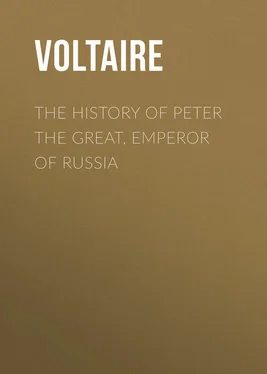Voltaire - The History of Peter the Great, Emperor of Russia
Здесь есть возможность читать онлайн «Voltaire - The History of Peter the Great, Emperor of Russia» — ознакомительный отрывок электронной книги совершенно бесплатно, а после прочтения отрывка купить полную версию. В некоторых случаях можно слушать аудио, скачать через торрент в формате fb2 и присутствует краткое содержание. Жанр: История, literature_18, foreign_prose, на английском языке. Описание произведения, (предисловие) а так же отзывы посетителей доступны на портале библиотеки ЛибКат.
- Название:The History of Peter the Great, Emperor of Russia
- Автор:
- Жанр:
- Год:неизвестен
- ISBN:нет данных
- Рейтинг книги:3 / 5. Голосов: 1
-
Избранное:Добавить в избранное
- Отзывы:
-
Ваша оценка:
- 60
- 1
- 2
- 3
- 4
- 5
The History of Peter the Great, Emperor of Russia: краткое содержание, описание и аннотация
Предлагаем к чтению аннотацию, описание, краткое содержание или предисловие (зависит от того, что написал сам автор книги «The History of Peter the Great, Emperor of Russia»). Если вы не нашли необходимую информацию о книге — напишите в комментариях, мы постараемся отыскать её.
The History of Peter the Great, Emperor of Russia — читать онлайн ознакомительный отрывок
Ниже представлен текст книги, разбитый по страницам. Система сохранения места последней прочитанной страницы, позволяет с удобством читать онлайн бесплатно книгу «The History of Peter the Great, Emperor of Russia», без необходимости каждый раз заново искать на чём Вы остановились. Поставьте закладку, и сможете в любой момент перейти на страницу, на которой закончили чтение.
Интервал:
Закладка:
He often blushed at the ignorance in which he had been brought up. He learned, almost of himself, without the help of a master, enough of German and high Dutch, to be able to write and explain himself tolerably well in both those languages. The Germans and Dutch appeared to him as the most civilized nations, because the former had already erected, in Moscow, some of those arts and manufactures which he was desirous of seeing established in his empire, and the latter excelled in the art of navigation, which he already began to look upon as the most necessary of all others.
Such were the dispositions which Peter cherished, notwithstanding the follies of his youth. At the same time, he found himself disturbed by factions at home, had the turbulent spirit of the strelitzes to keep under, and an almost uninterrupted war to manage against the Crim Tartars. For though hostilities had been suspended in 1689, by a truce, it had no long continuance.
During this interval, Peter became confirmed in his design of introducing the arts into his country.
His father Alexis had, in his lifetime, entertained the same views, but he wanted leisure, and a favourable opportunity to carry them into execution; he transmitted his genius to his son, who was more clear-sighted, more vigorous, and more unshaken by difficulties and obstacles.
Alexis had been at a great expense in sending for Bothler, 30 30 Memoirs of Petersburg and Moscow.
a ship builder and sea captain, from Holland, together with a number of shipwrights and sailors. These built a large frigate and a yacht upon the Wolga, which they navigated down that river to Astracan, where they were to be employed in building more vessels, for carrying on an advantageous trade with Persia, by the Caspian Sea. Just at this time the revolt of Stenko-Rasin broke out, and this rebel destroyed these two vessels, which he ought to have preserved for his own sake, and murdered the captain; the rest of the crew fled into Persia, from whence they got to some settlements belonging to the Dutch East India company. A master-builder, who was a good shipwright, staid behind in Russia, where he lived a long time in obscurity.
One day, Peter taking a walk at Ishmaelof, a summer-palace built by his grandfather, he perceived, among several other rarities, an old English shallop, which had lain entirely neglected: upon which he asked Timmerman, a German, and his mathematical teacher, how came that little boat to be of so different a construction from any he had seen on the Moska? Timmerman replied, that it was made to go with sails and oars. The young prince wanted instantly to make a trial of it; but it was first to be repaired and rigged. Brant, the ship-builder abovementioned, was by accident found out at Moscow, where he lived retired; he soon put the boat in order, and worked her upon the river Yauza, which washes the suburbs of the town.
Peter caused his boat to be removed to a great lake, in the neighbourhood of the convent of the Trinity; he likewise made Brant build two more frigates, and three yachts, and piloted them himself. A considerable time afterwards, viz. in 1694, he made a journey to Archangel, and having ordered a small vessel to be built in that port, by the same Brant, he embarked therein on the Frozen Sea, which no sovereign beside himself had ever beheld. On this occasion, he was escorted by a Dutch man of war, under the command of captain Jolson, and attended by all the merchant-vessels then in the port of Archangel. He had already learned the manner of working a ship; and, notwithstanding the pains his courtiers took to imitate their master, he was the only one who made a proficiency in it.
He found it no less difficult to raise a well disciplined body of land forces, on whom he could depend, than to establish a navy. His first essay in navigation, on a lake, previous to his journey to Archangel, was looked upon only as the amusements of a young prince of genius; and his first attempt to form a body of disciplined troops, likewise appeared as nothing more than that of diversion. This happened during the regency of the princess Sophia; and, had he been suspected of meaning any thing serious by this amusement, it might have been attended with fatal consequences to him.
He placed his confidence in a foreigner, the celebrated Le Fort, of a noble and ancient family in Piedmont, transplanted near two centuries ago to Geneva, where they have filled the most considerable posts in the state. He was intended to have been brought up to the trade, to which the town is indebted for the figure it now makes; having formerly been known only as the seat of religious controversies.
But his genius, which prompted him to the greatest undertakings, engaged him to quit his father's house at the age of fourteen; and he served four months 31 31 This should certainly be four years; as we can hardly suppose a boy of fourteen years and a half, would be received into the military service of any country, and much less by the Dutch at that period of time, when they stood in need of able and experienced soldiers, to withstand the attacks of the French, who breathed nothing less than the utter subversion of their state.
in quality of a cadet in the citadel of Marseilles; from thence he went to Holland, where he served some time as a volunteer, and was wounded at the siege of Grave, a strong fortified town on the Meuse, which the prince of Orange, afterwards king of England, retook from Lewis XIV. in 1674. After this, led by hopes of preferment, wherever he could find it, he embarked with a German colonel, named Verstin, who had obtained a commission from Peter's father, the czar Alexis, to raise soldiers in the Netherlands, and bring them to Archangel. But, when he arrived at that port, after a most fatiguing and dangerous navigation, the czar Alexis was no more; the government was changed, and Russia in confusion. The governor of Archangel suffered Verstin, Le Fort, and his whole troop, to remain a long time, in the utmost poverty and distress, and even threatened to send them into the extremity of Siberia; upon which every man shifted for himself. Le Fort, in want of every thing, repaired to Moscow, where he waited upon the Danish resident, named De Horn, who made him his secretary: there he learned the Russian language, and some time afterwards found means to be introduced to the czar Peter; the elder brother, Iwan, not being a person for his purpose. Peter was taken with him, and immediately gave him a company of foot. Le Fort had seen very little service, he knew but little of letters, not having studied any particular art or science; but he had seen a great deal, and had a talent of making the most of what he saw. Like the czar, he owed every thing to his own genius; he understood the German and Dutch languages, which Peter was learning, as those of two nations that might be of service in his designs. Every thing conspired to make him agreeable to Peter, to whom he strictly attached himself. From being the companion of his pleasures, he became his favourite, and confirmed himself in that station by his abilities. The czar made him his confidant in the most dangerous design that a prince of that country could possibly form, namely, that of putting himself in a condition to be able one day to break the seditious and barbarous body of forces called the strelitzes. It had cost the great sultan or basha Osman his life, for attempting to disband the janissaries. Peter, young as he was, went to work in a much abler manner than Osman.
He began with forming, at his country-seat at Preobrazinski, a company of fifty of his youngest domestics; and some young gentlemen, the sons of boyards, were chosen for their officers: but, in order to teach these young noblemen a subordination, to which they were wholly unaccustomed, he made them pass through all the different military degrees, and himself set them the example, by serving first as a drum, then as a private soldier, a serjeant, and a lieutenant of the company. Nothing was ever more extraordinary, nor more useful, than this conduct. The Russians had hitherto made war in the same manner as our ancestors at the time of the feudal tenures, when the unexperienced nobles took the field at the head of their vassals, undisciplined, and ill armed: a barbarous method, sufficient indeed to act against the like armies, but of no use against regular troops.
Читать дальшеИнтервал:
Закладка:
Похожие книги на «The History of Peter the Great, Emperor of Russia»
Представляем Вашему вниманию похожие книги на «The History of Peter the Great, Emperor of Russia» списком для выбора. Мы отобрали схожую по названию и смыслу литературу в надежде предоставить читателям больше вариантов отыскать новые, интересные, ещё непрочитанные произведения.
Обсуждение, отзывы о книге «The History of Peter the Great, Emperor of Russia» и просто собственные мнения читателей. Оставьте ваши комментарии, напишите, что Вы думаете о произведении, его смысле или главных героях. Укажите что конкретно понравилось, а что нет, и почему Вы так считаете.












